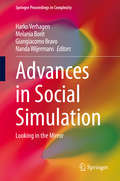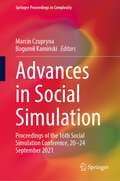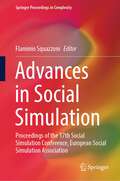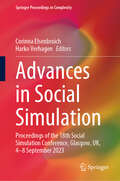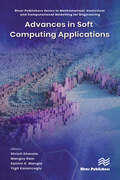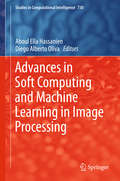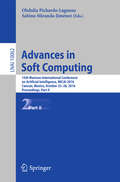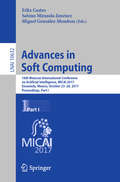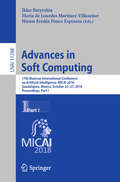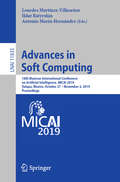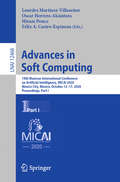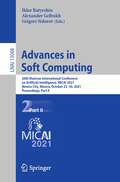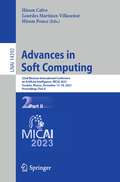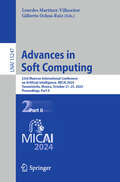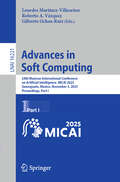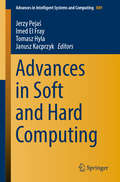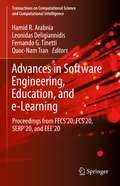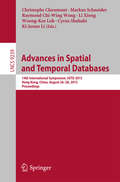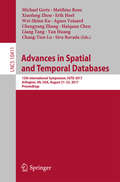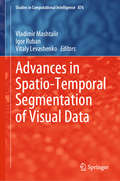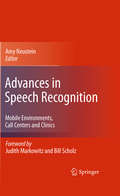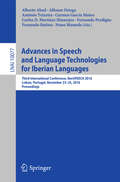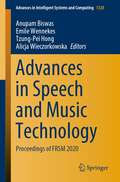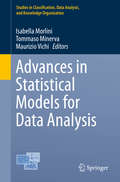- Table View
- List View
Advances in Social Simulation: Looking in the Mirror (Springer Proceedings in Complexity)
by Harko Verhagen Melania Borit Giangiacomo Bravo Nanda WijermansThis book presents the state-of-the-art in social simulation as presented at the Social Simulation Conference 2018 in Stockholm, Sweden. It covers the developments in applications and methods of social simulation, addressing societal issues such as socio-ecological systems and policy making. Methodological issues discussed include large-scale empirical calibration, model sharing and interdisciplinary research, as well as decision making models, validation and the use of qualitative data in simulation modeling. Research areas covered include archaeology, cognitive science, economics, organization science, and social simulation education.This collection gives readers insight into the increasing use of social simulation in both its theoretical development and in practical applications such as policy making whereby modelling and the behavior of complex systems is key. The book will appeal to students, researchers and professionals in the various fields.
Advances in Social Simulation: Proceedings of the 16th Social Simulation Conference, 20–24 September 2021 (Springer Proceedings in Complexity)
by Bogumił Kamiński Marcin CzuprynaThis book covers the latest advances in applying agent-based modelling in social sciences. The Social Simulation Conference is the major global conference devoted to this topic. It is aimed at promoting social simulation and computational social science. This year’s special theme is “Social Simulation geared towards Post-Pandemic times”, focused not only on questions raised by the current pandemic but also on future challenges related to economic recovery, such as localization, globalization, inequality, sustainable growth and social changes induced by progressive digitalization, data availability and artificial intelligence. The primary audience of this book are scholars and practitioners in computational social sciences including economics, business, sociology, politics, psychology and urban studies.
Advances in Social Simulation: Proceedings of the 17th Social Simulation Conference, European Social Simulation Association (Springer Proceedings in Complexity)
by Flaminio SquazzoniThis book highlights recent developments in the field of computer simulation and its application to social dynamics and behaviour. It covers latest advancements in the use of agent-based modelling by focusing on thematic issues, methodological progress and applications, including policy, industry and business. It aims to promote this interdisciplinary type of research by showing synergies, complementary and integration especially between computer sciences, social sciences, economics and organization, often bridging qualitative and quantitative research. The primary audience of this book are academics, practitioners and professionals using computer simulation for business counselling or industry.
Advances in Social Simulation: Proceedings of the 18th Social Simulation Conference, Glasgow, UK, 4–8 September 2023 (Springer Proceedings in Complexity)
by Corinna Elsenbroich Harko VerhagenThis book contains the proceedings of the 18th Social Simulation Conference (SSC) and covers the state of the art of social simulation modeling. The SSC is the annual conference of the European Social Simulation Association (ESSA) and the major global conference devoted to this topic. It is aimed at promoting social simulation and computational social science. The book is the biggest collection of agent-based modeling research. It covers all aspects of modeling, from theory and philosophy of modeling to question of model design, purpose, and structure, using data, visualization, model interrelation, and open modeling. This book is targeted at researchers in social simulation regardless of disciplinary backgrounds, across career stages and different sectors, such as academia, industry, and policy
Advances in Soft Computing Applications (River Publishers Series in Mathematical, Statistical and Computational Modelling for Engineering)
by Mangey Ram Sachin K. Mangla Yigit Kazancoglu Shristi KharolaThe proclivity of today’s technology to think like humans may be seen in new developing disciplines such as neural computing, fuzzy logic, evolutionary computation, machine learning, and probabilistic reasoning. These strategies are grouped together into one main technique known as "soft computing." This book discusses the most recent soft computing and fuzzy logic-based applications and innovations in industrial advancements, supply chain and logistics, system optimization, decision-making, artificial intelligence, smart systems, and other rapidly evolving technologies. In today’s competitive world, the book provides soft computing solutions to help companies overcome the obstacles posed by sophisticated decision-making systems.
Advances in Soft Computing and Machine Learning in Image Processing (Studies in Computational Intelligence #730)
by Aboul Ella Hassanien Diego Alberto OlivaThis book is a collection of the latest applications of methods from soft computing and machine learning in image processing. It explores different areas ranging from image segmentation to the object recognition using complex approaches, and includes the theory of the methodologies used to provide an overview of the application of these tools in image processing. The material has been compiled from a scientific perspective, and the book is primarily intended for undergraduate and postgraduate science, engineering, and computational mathematics students. It can also be used for courses on artificial intelligence, advanced image processing, and computational intelligence, and is a valuable resource for researchers in the evolutionary computation, artificial intelligence and image processing communities.
Advances in Soft Computing: 15th Mexican International Conference on Artificial Intelligence, MICAI 2016, Cancún, Mexico, October 23–28, 2016, Proceedings, Part II (Lecture Notes in Computer Science #10062)
by Obdulia Pichardo-Lagunas Sabino Miranda-JiménezThe two-volume set LNAI 10061 and 10062 constitutes the proceedings of the 15th Mexican International Conference on Artificial Intelligence, MICAI 2016, held in Canc#65533;n, Mexico, in October 2016. The total of 86 papers presented in these two volumes was carefully reviewed and selected from 238 submissions. The contributions were organized in the following topical sections: Part I: natural language processing; social networks and opinion mining; fuzzy logic; time series analysis and forecasting; planning and scheduling; image processing and computer vision; robotics. Part II: general; reasoning and multi-agent systems; neural networks and deep learning; evolutionary algorithms; machine learning; classification and clustering; optimization; data mining; graph-based algorithms; and intelligent learning environments.
Advances in Soft Computing: 16th Mexican International Conference on Artificial Intelligence, MICAI 2017, Enseneda, Mexico, October 23-28, 2017, Proceedings, Part I (Lecture Notes in Computer Science #10632)
by Sabino Miranda-Jiménez Félix Castro Miguel González-MendozaThe two-volume set LNAI 10632 and 10633 constitutes the proceedings of the 16th Mexican International Conference on Artificial Intelligence, MICAI 2017, held in Enseneda, Mexico, in October 2017. The total of 60 papers presented in these two volumes was carefully reviewed and selected from 203 submissions. The contributions were organized in the following topical sections: Part I: neural networks; evolutionary algorithms and optimization; hybrid intelligent systems and fuzzy logic; and machine learning and data mining. Part II: natural language processing and social networks; intelligent tutoring systems and educational applications; and image processing and pattern recognition.
Advances in Soft Computing: 17th Mexican International Conference on Artificial Intelligence, MICAI 2018, Guadalajara, Mexico, October 22–27, 2018, Proceedings, Part I (Lecture Notes in Computer Science #11288)
by Hiram Eredín Ponce Espinosa Ildar Batyrshin María de Lourdes Martínez-VillaseñorThe two-volume set LNAI 11288 and 11289 constitutes the proceedings of the 17th Mexican International Conference on Artificial Intelligence, MICAI 2018, held in Guadalajara, Mexico, in October 2018. The total of 62 papers presented in these two volumes was carefully reviewed and selected from 149 submissions. The contributions are organized in topical as follows:Part I: evolutionary and nature-inspired intelligence; machine learning; fuzzy logic and uncertainty management.Part II: knowledge representation, reasoning, and optimization; natural language processing; and robotics and computer vision.
Advances in Soft Computing: 18th Mexican International Conference on Artificial Intelligence, MICAI 2019, Xalapa, Mexico, October 27 – November 2, 2019, Proceedings (Lecture Notes in Computer Science #11835)
by Ildar Batyrshin Lourdes Martínez-Villaseñor Antonio Marín-HernándezThis volume constitutes the proceedings of the 18th Mexican Conference on Artificial Intelligence, MICAI 2019, held in Xalapa, Mexico, in October/November 2019. The 59 full papers presented in this volume were carefully reviewed and selected from 148 submissions. They cover topics such as: machine learning; optimization and planning; fuzzy systems, reasoning and intelligent applications; and vision and robotics.
Advances in Soft Computing: 19th Mexican International Conference on Artificial Intelligence, MICAI 2020, Mexico City, Mexico, October 12–17, 2020, Proceedings, Part I (Lecture Notes in Computer Science #12468)
by Oscar Herrera-Alcántara Lourdes Martínez-Villaseñor Hiram Ponce Félix A. Castro-EspinozaThe two-volume set LNAI 12468 and 12469 constitutes the proceedings of the 19th Mexican International Conference on Artificial Intelligence, MICAI 2020, held in Mexico City, Mexico, in October 2020. The total of 77 papers presented in these two volumes was carefully reviewed and selected from 186 submissions. The contributions are organized in topical as follows: Part I: machine and deep learning, evolutionary and metaheuristic algorithms, and soft computing. Part II: natural language processing, image processing and pattern recognition, and intelligent applications and robotics.
Advances in Soft Computing: 20th Mexican International Conference on Artificial Intelligence, MICAI 2021, Mexico City, Mexico, October 25–30, 2021, Proceedings, Part II (Lecture Notes in Computer Science #13068)
by Grigori Sidorov Alexander Gelbukh Ildar BatyrshinThe two-volume set LNAI 13067 and 13068 constitutes the proceedings of the 20th Mexican International Conference on Artificial Intelligence, MICAI 2021, held in Mexico City, Mexico, in October 2021.The total of 58 papers presented in these two volumes was carefully reviewed and selected from 129 submissions. The first volume, Advances in Computational Intelligence, contains 30 papers structured into three sections: – Machine and Deep Learning – Image Processing and Pattern Recognition – Evolutionary and Metaheuristic Algorithms The second volume, Advances in Soft Computing, contains 28 papers structured into two sections: – Natural Language Processing – Intelligent Applications and Robotics
Advances in Soft Computing: 22nd Mexican International Conference on Artificial Intelligence, MICAI 2023, Yucatán, Mexico, November 13–18, 2023, Proceedings, Part II (Lecture Notes in Computer Science #14392)
by Hiram Calvo Lourdes Martínez-Villaseñor Hiram PonceThe two-volume set LNAI 14391 and 14392 constitutes the proceedings of the 22nd Mexican International Conference on Artificial Intelligence, MICAI 2023, held in Yucatán, Mexico, in November 2023.The total of 49 papers presented in these two volumes was carefully reviewed and selected from 115 submissions.The proceedings of MICAI 2023 are published in two volumes. The first volume, Advances in Computational Intelligence, contains 24 papers structured into three sections:– Machine Learning– Computer Vision and Image Processing– Intelligent SystemsThe second volume, Advances in Soft Computing, contains 25 papers structured into three sections:– Natural Language Processing– Bioinformatics and Medical Applications– Robotics and Applications
Advances in Soft Computing: 23rd Mexican International Conference on Artificial Intelligence, MICAI 2024, Tonantzintla, Mexico, October 21–25, 2024, Proceedings, Part II (Lecture Notes in Computer Science #15247)
by Lourdes Martínez-Villaseñor Gilberto Ochoa-RuizThe two-volume set, LNAI 15246 and 15247, constitutes the proceedings of the 23rd Mexican International Conference on Artificial Intelligence, MICAI 2024, held in Tonantzintla, Mexico in October 21–25, 2024. The 37 full papers presented in these proceedings were carefully reviewed and selected from 141 submissions. The papers presented in these two volumes are organized in the following topical sections: Part I - Machine Learning; Computer Vision. Part II - Intelligent Systems; Bioinformatics and Medical Applications; Natural Language Processing.
Advances in Soft Computing: 24th Mexican International Conference on Artificial Intelligence, MICAI 2025, Guanajuato, Mexico, November 3, 2025, Proceedings, Part I (Lecture Notes in Computer Science #16221)
by Lourdes Martínez-Villaseñor Gilberto Ochoa-Ruiz Roberto A. VázquezThe two-volume set, LNAI 16221 and 16222, constitutes the proceedings of the 4th Mexican International Conference on Artificial Intelligence, MICAI 2025, held in Guanajuato, Mexico, November 3, 2025 The 65 full papers presented in these proceedings were carefully reviewed and selected from 119 submissions. The papers presented in these two volumes are organized in the following topical sections: Part I - Machine Learning; Natural Language Processing and Neural Networks. Part II - Applications; Pattern Recognition; Computer Vision & Image Processing and Bioinformatics & Medical Applications.
Advances in Soft and Hard Computing (Advances In Intelligent Systems and Computing #889)
by Janusz Kacprzyk Imed El Fray Jerzy Pejaś Tomasz HylaThe book presents a collection of carefully selected, peer-reviewed papers from the 21st International Multi-Conference on Advanced Computer Systems 2018 (ACS 2018), which was held in Międzyzdroje, Poland on September 24th-26th, 2018. The goal of the ACS 2018 was to bring artificial intelligence, software technologies, biometrics, IT security and distance learning researchers in contact with the ACS community, and to give ACS attendees the opportunity to exchange notes on the latest advances in these areas of interest. The primary focus of the book is on high-quality, original and unpublished research, case studies, and implementation experiences. All of the respective papers are of practical relevance to the construction, evaluation, application or operation of advanced systems. The topics addressed are divided into five major groups: artificial intelligence, software technologies, information technology security, multimedia systems, and information system design.
Advances in Software Engineering, Education, and e-Learning: Proceedings from FECS'20, FCS'20, SERP'20, and EEE'20 (Transactions on Computational Science and Computational Intelligence)
by Hamid R. Arabnia Quoc-Nam Tran Leonidas Deligiannidis Fernando G. TinettiThis book presents the proceedings of four conferences: The 16th International Conference on Frontiers in Education: Computer Science and Computer Engineering + STEM (FECS'20), The 16th International Conference on Foundations of Computer Science (FCS'20), The 18th International Conference on Software Engineering Research and Practice (SERP'20), and The 19th International Conference on e-Learning, e-Business, Enterprise Information Systems, & e-Government (EEE'20). The conferences took place in Las Vegas, NV, USA, July 27-30, 2020 as part of the larger 2020 World Congress in Computer Science, Computer Engineering, & Applied Computing (CSCE'20), which features 20 major tracks. Authors include academics, researchers, professionals, and students. This book contains an open access chapter entitled, "Advances in Software Engineering, Education, and e-Learning".Presents the proceedings of four conferences as part of the 2020 World Congress in Computer Science, Computer Engineering, & Applied Computing (CSCE'20);Includes the tracks Computer Engineering + STEM, Foundations of Computer Science, Software Engineering Research, and e-Learning, e-Business, Enterprise Information Systems, & e-Government;Features papers from FECS'20, FCS'20, SERP'20, EEE'20, including one open access chapter.
Advances in Spatial and Temporal Databases: 14th International Symposium, SSTD 2015, Hong Kong, China, August 26-28, 2015. Proceedings (Lecture Notes in Computer Science #9239)
by Christophe Claramunt Markus Schneider Raymond Chi-Wing Wong Li Xiong Woong-Kee Loh Cyrus Shahabi Ki-Joune LiThis book constitutes the refereed proceedings of the 14th International Symposium on Spatial and Temporal Databases, SSTD 2015, held in Hong Kong, China, in August 2015. The 24 revised full papers together with 8 demos presented were carefully reviewed and selected from 64 submissions. The conference program has the scope on following subjects: reachability query and path query, reverse query and indexing, navigation and routing, trajectory analysis, spatio-temporal approaches, privacy and matching, similarity search and pattern, keyword and pattern.
Advances in Spatial and Temporal Databases: 15th International Symposium, SSTD 2017, Arlington, VA, USA, August 21 – 23, 2017, Proceedings (Lecture Notes in Computer Science #10411)
by Michael Gertz, Matthias Renz, Xiaofang Zhou, Erik Hoel, Wei-Shinn Ku, Agnes Voisard, Chengyang Zhang, Haiquan Chen, Liang Tang, Yan Huang, Chang-Tien Lu and Siva RavadaThis book constitutes the refereed proceedings of the 15th International Symposium on Spatial and Temporal Databases, SSTD 2017, held in Arlington, VA, USA, in August 2017.The 19 full papers presented together with 8 demo papers and 5 vision papers were carefully reviewed and selected from 90 submissions. The papers are organized around the current research on concepts, tools, and techniques related to spatial and temporal databases.
Advances in Spatio-Temporal Segmentation of Visual Data (Studies in Computational Intelligence #876)
by Vladimir Mashtalir Igor Ruban Vitaly LevashenkoThis book proposes a number of promising models and methods for adaptive segmentation, swarm partition, permissible segmentation, and transform properties, as well as techniques for spatio-temporal video segmentation and interpretation, online fuzzy clustering of data streams, and fuzzy systems for information retrieval. The main focus is on the spatio-temporal segmentation of visual information. Sets of meaningful and manageable image or video parts, defined by visual interest or attention to higher-level semantic issues, are often vital to the efficient and effective processing and interpretation of viewable information. Developing robust methods for spatial and temporal partition represents a key challenge in computer vision and computational intelligence as a whole.This book is intended for students and researchers in the fields of machine learning and artificial intelligence, especially those whose work involves image processing and recognition, video parsing, and content-based image/video retrieval.
Advances in Speech Recognition: Mobile Environments, Call Centers and Clinics
by Amy NeusteinThis volume is comprised of contributions from eminent leaders in the speech industry, and presents a comprehensive and in depth analysis of the progress of speech technology in the topical areas of mobile settings, healthcare and call centers. The material addresses the technical aspects of voice technology within the framework of societal needs, such as the use of speech recognition software to produce up-to-date electronic health records, not withstanding patients making changes to health plans and physicians. Included will be discussion of speech engineering, linguistics, human factors analysis, medical informatics, business and information technology, electronics and communications engineering, all integrated into a cohesive work.
Advances in Speech and Language Technologies for Iberian Languages: Third International Conference, IberSPEECH 2016, Lisbon, Portugal, November 23-25, 2016, Proceedings (Lecture Notes in Computer Science #10077)
by Alberto Abad, Alfonso Ortega, António Teixeira, Carmen García Mateo, Carlos D. Martínez Hinarejos, Fernando Perdigão, Fernando Batista and Nuno MamedeThis book constitutes the refereed proceedings of the IberSPEECH 2016 Conference, held in Lisbon, Portugal, in November 2016. The 27 papers presented were carefully reviewed and selected from 48 submissions.The selected articles in this volume are organized into four different topics:Speech Production, Analysis, Coding and Synthesis;Automatic Speech Recognition;Paralinguistic Speaker Trait Characterization;Speech and Language Technologies in Different Application Fields
Advances in Speech and Music Technology: Proceedings of FRSM 2020 (Advances in Intelligent Systems and Computing #1320)
by Tzung-Pei Hong Anupam Biswas Alicja Wieczorkowska Emile WennekesThis book features original papers from 25th International Symposium on Frontiers of Research in Speech and Music (FRSM 2020), jointly organized by National Institute of Technology, Silchar, India, during 8–9 October 2020. The book is organized in five sections, considering both technological advancement and interdisciplinary nature of speech and music processing. The first section contains chapters covering the foundations of both vocal and instrumental music processing. The second section includes chapters related to computational techniques involved in the speech and music domain. A lot of research is being performed within the music information retrieval domain which is potentially interesting for most users of computers and the Internet. Therefore, the third section is dedicated to the chapters related to music information retrieval. The fourth section contains chapters on the brain signal analysis and human cognition or perception of speech and music. The final section consists of chapters on spoken language processing and applications of speech processing.
Advances in Statistical Bioinformatics: Models and Integrative Inference for High-Throughput Data
by Kim-Anh Do Zhaohui Steve Qin Marina VannucciProviding genome-informed personalized treatment is a goal of modern medicine. Identifying new translational targets in nucleic acid characterizations is an important step toward that goal. The information tsunami produced by such genome-scale investigations is stimulating parallel developments in statistical methodology and inference, analytical frameworks, and computational tools. Within the context of genomic medicine and with a strong focus on cancer research, this book describes the integration of high-throughput bioinformatics data from multiple platforms to inform our understanding of the functional consequences of genomic alterations. This includes rigorous and scalable methods for simultaneously handling diverse data types such as gene expression array, miRNA, copy number, methylation, and next-generation sequencing data. This material is written for statisticians who are interested in modeling and analyzing high-throughput data. Chapters by experts in the field offer a thorough introduction to the biological and technical principles behind multiplatform high-throughput experimentation.
Advances in Statistical Models for Data Analysis (Studies in Classification, Data Analysis, and Knowledge Organization)
by Isabella Morlini Tommaso Minerva Maurizio VichiThis edited volume focuses on recent research results in classification, multivariate statistics and machine learning and highlights advances in statistical models for data analysis. The volume provides both methodological developments and contributions to a wide range of application areas such as economics, marketing, education, social sciences and environment. The papers in this volume were first presented at the 9th biannual meeting of the Classification and Data Analysis Group (CLADAG) of the Italian Statistical Society, held in September 2013 at the University of Modena and Reggio Emilia, Italy.
